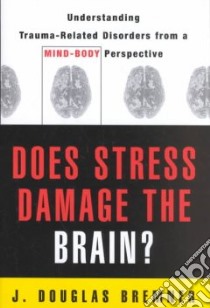Does Stress Damage the Brain? - 9780393703450
Un libro in lingua di Bremner J. Douglas M.D. edito da W W Norton & Co Inc, 2002
- € 24.90
- Il prezzo è variabile in funzione del cambio della valuta d’origine
Why is it that we can remember exactly where we were when John Kennedy was shot, or when the Space Shuttle Challenger exploded, or on September 11, 2001? Does what we see, hear, feel, and in other ways experience, especially during times of stress, result in permanent changes to our brains? Is this one of the reasons stressful events become seared in our memories? These provocative questions, and many others, are answered here by J. Douglas Bremner, a leading scientist whose discoveries, and that of his colleagues, showed that extreme stress may result in lasting damage to the brain, especially a part of the brain involved in memory.
Readers will join Bremner as he recounts the harrowing stories of people under stress-from WWI soldiers to Vietnam combat veterans to survivors of the September 11 terrorist attacks-and gathers evidence for his intriguing proposition that stress actually damages the brain. As this book will explain, scientists now believe that stress-related brain damage may cause certain psychological disorders, such as posttraumatic stress disorder (PTSD). There are in fact a range psychological disorders related to stress, what we are now calling the 'trauma spectrum disorders,' that may be manifestations of stress-induced changes in the brain.
This new understanding of trauma-related problems as essentially neurological disorders has many important implications. What a difference it would make if someone who experiences anxiety or depression realized that they were not at fault for these experiences, but rather these experiences were the result of brain-based changes as a result of stress? In certain cases, thinking about the effects of stress on the brain may help understand puzzling phenomena, like delayed recall of childhood abuse.
The scope and breadth of traumatic stress today make this book especially relevant. Our country will be sorting out the many patterns of response to recent traumatic events for years to come. If knowledge is power, then all readers will benefit from a greater knowledge of the potential effects of traumatic stress on mind, brain, body, and spirit. With over ten years of experience in researching the effects of stress on people, Douglas Bremner is uniquely qualified to help us make sense of the ways in which we experience stress.
Informazioni bibliografiche
- Titolo del Libro in lingua: Does Stress Damage the Brain?
- Sottotitolo: Understanding Trauma-Related Disorders from a Mind-Body Perspective
- Lingua: English
- Autore: Bremner J. Douglas M.D.
- Editore: W W Norton & Co Inc
- Collana: W W Norton & Co Inc (Hardcover)
- Data di Pubblicazione: 01 Gennaio '02
- Genere: PSYCHOLOGY
- Argomenti : Post-traumatic stress disorder Traumatism Stress (Psychology
- Pagine: 311
- Dimensioni mm: 209 x 146 x 31
- ISBN-10: 0393703452
- EAN-13: 9780393703450


